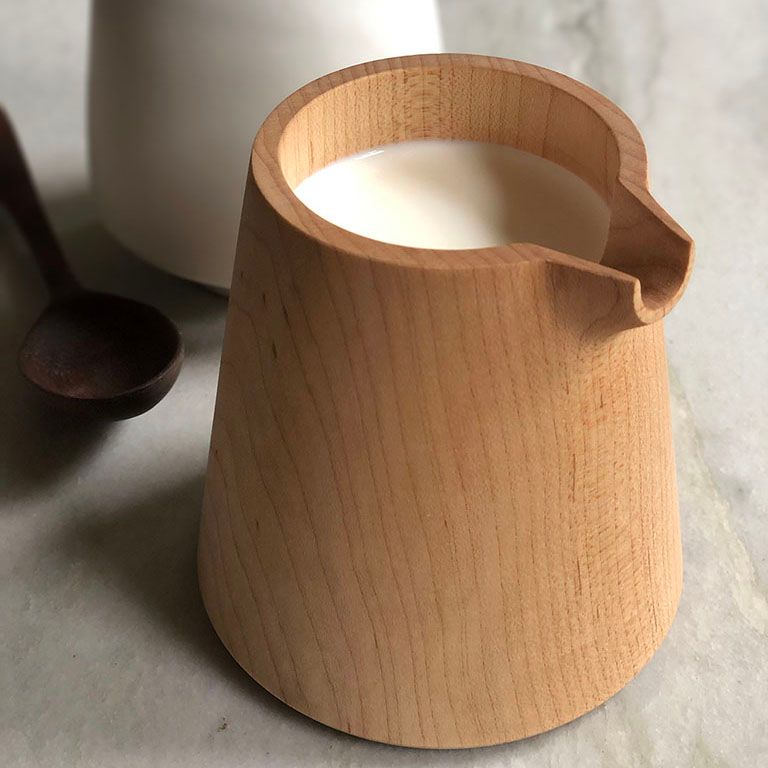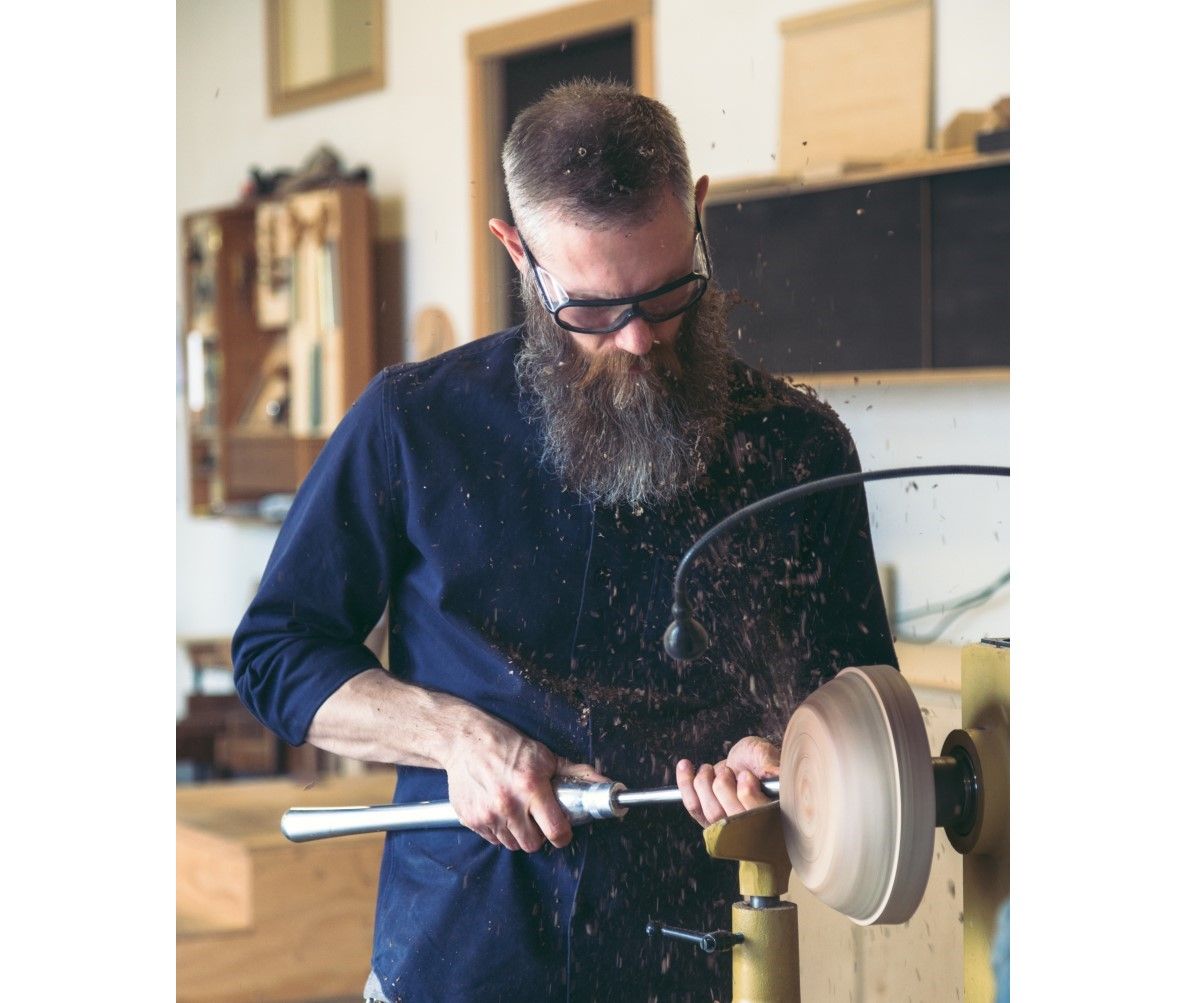Interested in starting your own entrepreneurial journey in fine arts but unsure what to expect? Then read up on our interview with Sterling Collins, Owner of Hew, located in Portland, OR, USA.
What's your business, and who are your customers?
Hew is a small furniture and homewares company out of Portland, Oregon. I think our work meets at the intersection of craft and design and where that overlaps with everyday life. We focus heavily on making pieces by hand – often hand carved or turned on a lathe. Furniture scale work gets just as much attention to detail and craft as pieces you can hold in your hand. There is an intimacy I think that can form with the objects we live with, whether they are part of your daily routine or they serve as a gathering place. I know this is a rather romantic view, but we think a lot about how our pieces will be used in your home.
More specifically, we split our attention at Hew in several ways. We have our more public-facing side, our small collection of home goods. This ranges from salt cellars and creamers to hand brooms and trash bins. All of this is handmade, carved, or turned out of solid domestic hardwoods. Wooden craft objects are certainly a niche market here in the US, one that we have gladly stepped into. As we continue to navigate this, I think we will begin shifting our focus to more one-off and limited-run pieces. I think this will showcase the craft better and keep me interested over the long haul.
In addition to our collection, we do some fun projects with local companies. We have relationships with several local lighting companies and do a fair amount of their woodwork, which has been great. And we are at the tail end of crafting, serving, and eating wares for a new restaurant – hundreds of pieces. Recently consulted on a large public art piece as well. So a good deal of variety, we have been lucky to work with some great folks and be able to curate what we participate in.
Lastly, integral to our practice and our commitment to maintaining the craft is teaching folks. We tend to offer classes ranging from beginner-level turning and spoon carving, and as we begin to pull out of the pandemic will be expanding our offering to include more advanced intensives. So quite a bit going on at the shop definitely keeps us busy.

Tell us about yourself
Hi, I'm Sterling Collins of Hew. I started Hew in 2013 while at Oregon College of Art and Crafts. Before moving to Oregon to go to OCAC, I practiced architecture. The firm I worked for mostly did extremely large projects, super and mega tall towers - literally the tallest towers in the world. I certainly learned a lot, but I was always more detailed-focused and concerned with how we negotiate our built environment at the human scale. Towers design is fairly removed from that. While practicing architecture, I rented a little woodshop with a couple of other craftsmen. It was a great outlet. Eventually, I decided to pursue woodworking a little more seriously, so I moved to Oregon and went to OCAC to hone my woodworking chops with the intention of starting a woodworking business afterward. And I did.
I love working with wood and creating things, so it’s fairly easy to stay motivated. I was working hard to expand the business last year. I hired our first employee, so that was very exciting. As far as the craft itself, there is always more to learn, a different way to do something – maybe it’s “better” in some way or maybe just more satisfying. Returning to making just for fun from time to time certainly helps when things become a little heavy. I love talking about woodworking, so teaching has come quite naturally. I just get to nerd out with folks who are curious.
What's your biggest accomplishment as a business owner?
Biggest accomplishment, that’s a hard one to answer in a way. I think more than one big accomplishment. It’s really been a string of smaller ones that add up over time. It’s nice to zoom out from time to time to see that progress and take stock of how far you’ve come. It’s always beneficial to step away from the current project and see the big picture – make sure you’re on the path you want. One goal I have for the future is to become a B-Corp. Once that happens, I'll mark that as a big achievement.
If I had to narrow it down to a single accomplishment, though, I’d say going from part-time to full-time. Maybe that sounds small, but it was really the beginning. Originally when I started out, I split my time between working at Oregon College of Art and Craft and Pacific Northwest College of Art and spent the other half of my time working at my shop. There was a certain comfort and regularity in having a “steady” job. Making that leap is stressful and can be pretty uncertain. While I may have started in 2013, I stayed at the tipping point for a good while. I didn’t put in full effort and go full time until three years ago. I’ve found a lot more success in these last few years than I expected. Sometimes starting can be the hardest thing.
What's one of the hardest things that come with being a business owner?
Being a small business owner can be very stressful. As a craftsperson, I’m not necessarily that great of a “businessperson.” So, in addition to learning woodworking, I’m still learning to operate a craft business. This means, as I’m sure is said over and over, you wear many hats. This can be tiring. I’m a maker. I want to make stuff.
Time management, for me personally, is one of the more challenging things and a source of stress. I’m good at coordinating complex projects or timelines, but if I don’t estimate accurately how much time it will take me to complete a project, it has ripple effects on my shop schedule. Add in all the other tasks you have to balance as an owner, and it can be a lot sometimes. It's a rather basic yet ongoing source of stress.
What are the top tips you'd give to anyone looking to start, run and grow a business today?
- Everyone is in a different situation, and starting a new business can be intimidating. I don’t think there is a “right” way to get started, though. I really think just getting started in any way is the important part. There is nothing wrong with starting small and growing into the business you want.
- I tend to be more of a “figure it out” type of person, so if I want to do something, I’ll figure out a way to get it done. As a small business owner, you have to be flexible to stay afloat.
- Growing a business, if you have the magic bullet, let me know. This depends so much on your business type, size, age, etc. I’m certainly no expert in this field. Bearing in mind success is subjective, I think it’s similar to growth. Measuring growth against where you’ve come from could mean solid metrics like increased profit margins next quarter or expansion to a second location, but it can also be just getting enough gigs strung together to pay the rent with a little left over. So I have no one fits all piece of advice. Mine is a craft business, which is a very personal business in many ways, but it has certain natural limitations from a growth standpoint. I think a lot of craft-based businesses have this issue. I can only make so much in a day. There are certain methods of making and a level of the final product I wish to maintain - which, from a growth point of view, may be detrimental. It’s time-consuming and costs a lot. Maybe I could do some things faster and cheaper but certainly not better (in my view). So expanding my business has been reliant on delegating, good communication, and maintaining good relationships. I’m working to be better at these, but they only become more important the further you go.
Where can people find you and your business?
Website: https://www.hewwoodworking.com/
Facebook: https://www.facebook.com/HewWoodworking/
Instagram: https://www.instagram.com/hewwoodworking/
If you like what you've read here and have your own story as a solo or small business entrepreneur that you'd like to share, then please answer these interview questions. We'd love to feature your journey on these pages.
Turn your craft into recurring revenue with Subkit. Start your subscription offering in minutes and supercharge it with growth levers. Get early access here.



